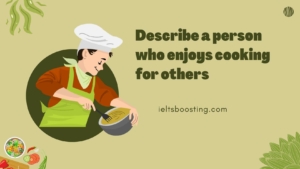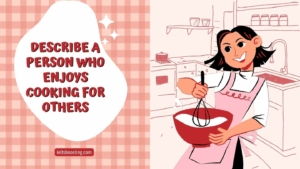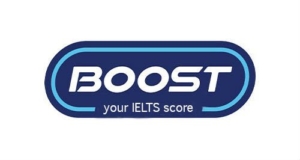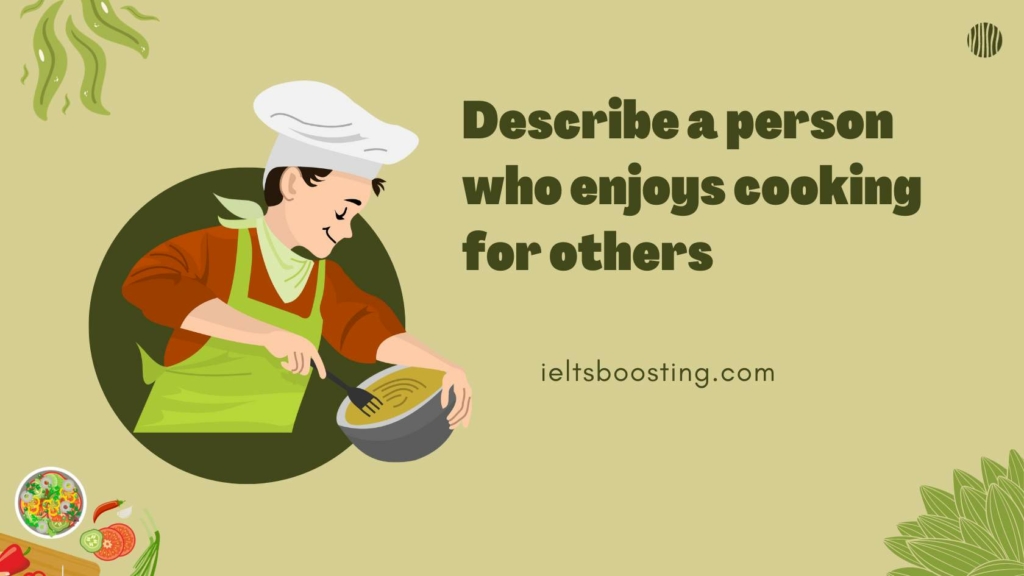Describe a person who enjoys cooking for others
You should say for describe a person who enjoys cooking for others
Who this person is
What he/she likes to cook
Who he/she cooks for
And explain why he/she enjoys cooking

Describe a person who enjoys cooking for others
Sample answer for Describe a person who enjoys cooking for others
I’d like to talk about my dear friend, Trang, who has a genuine passion for cooking and derives immense joy from preparing delicious meals for others. Trang is an exceptional cook, known among our circle of friends for her culinary prowess. She takes immense pleasure in experimenting with diverse cuisines, from traditional Vietnamese dishes like pho and spring rolls to international favorites such as Italian pasta and Indian curries. Her cooking is a delightful fusion of flavors, and she often adds her unique twists to recipes, making each dish a culinary masterpiece.
One of her most remarkable qualities is her generosity with her culinary creations. Trang often invites friends and family over for gatherings, where she takes the role of the host and chef. Her face lights up when she sees the smiles and hear the praises of those savoring her dishes. She derives deep satisfaction from knowing that her cooking brings people together and creates memorable moments. Trang’s love for cooking for others stems from her belief that food is a universal language of
love and connection. She sees cooking as a way to nurture relationships, to express care and affection, and to create a sense of belonging.
For her, the act of cooking is not merely a chore but a heartfelt expression of her love for the people in her life. Moreover, she finds solace and a sense of accomplishment in the kitchen. Preparing meals allows her to channel her creativity, reduce stress, and find fulfillment in providing for others. It’s her way of making people feel cherished and cherished by them in return.
In conclusion, Trang is an extraordinary individual who finds immense joy in cooking for others. Her culinary talents, coupled with her generosity and love for connecting with people through food, make her a true culinary artist and a cherished friend.
High-level vocabulary:
● Culinary prowess – Sự tài năng về nấu nướng
● Fusion of flavors – Sự kết hợp hương vị
● Generosity – Sự hào phóng
● Culinary creations – Sản phẩm nấu nướng
● Nurturing relationships – Nuôi dưỡng mối quan hệ
● Sense of belonging – Cảm giác thuộc về
● Solace – Sự an ủi
● Fulfillment – Sự hoàn thiện, đáp ứng
Phrasal Verbs (Definitions in Vietnamese):
● Lights up – Rạng ngời, tỏa sáng
● Savoring her dishes – Thưởng thức các món của cô
● Channel her creativity – Kênh hướng sự sáng tạo của mình
● Reduce stress – Giảm căng thẳng
● Providing for others – Cung cấp cho người khác
Explore more: ielts speaking part 2

Describe a person who enjoys cooking for others
Part 3-Describe a person who enjoys cooking for others
What do we need to prepare when we need to cook?
When it comes to cooking, preparation is key. First, you need the right ingredients for whatever dish you’re planning to make. Then, there’s the equipment – pots, pans, utensils, and sometimes specialized tools, depending on the recipe. It’s also important to have a clear workspace and, ideally, a rough idea of the cooking process, maybe a recipe or instructions at hand.”
Useful Vocabulary:
- Preparation: The action or process of getting ready for some undertaking.
- Ingredients: The components or elements that are put together in cooking.
- Equipment: The necessary tools, devices, or materials for a particular purpose.
- Utensils: Tools used in the kitchen for cooking.
- Specialized Tools: Equipment designed for a specific type of cooking or recipe.
- Workspace: The area where one works, especially in cooking or other practical tasks.
- Cooking Process: The method or steps taken to prepare and cook food.
- Recipe: A set of instructions for preparing a particular dish.
- Instructions: Detailed information on how to do something.
- At Hand: Available; within reach or close by.
Do you agree that food is an important part of Vietnamese festivals?
Absolutely, I wholeheartedly agree that food plays a crucial role in Vietnamese festivals. It’s not just about sustenance; it’s deeply intertwined with the cultural and traditional aspects of these celebrations. Each festival has its unique dishes that carry significant meanings and are part of the festivity’s identity. From Tết with its Bánh Chưng to the Mid-Autumn Festival with mooncakes, these foods are as essential to the festival spirit as the events themselves.”
Useful Vocabulary:
- Crucial Role: An extremely important or vital function.
- Sustenance: Food and drink regarded as a source of strength; nourishment.
- Intertwined: Twisted together or closely connected.
- Cultural and Traditional Aspects: Elements that are part of the customs and practices of a particular group or society.
- Unique Dishes: Food items that are specific or special to a particular event or culture.
- Significant Meanings: Important or meaningful symbols.
- Festivity’s Identity: The distinctive character or atmosphere of a celebration.
- Tết: Vietnamese Lunar New Year.
- Bánh Chưng: A traditional Vietnamese rice cake.
- Mid-Autumn Festival: An East and Southeast Asian festival celebrating the moon.
- Mooncakes: A type of Chinese pastry traditionally eaten during the Mid-Autumn Festival.
- Festival Spirit: The mood or atmosphere specific to a particular celebration.
Which dishes are a must at festivals?
Certain dishes are considered essential at festivals as they represent cultural significance and festivity. These dishes often carry symbolic meanings, such as prosperity, longevity, or unity, which are particularly meaningful during celebratory times. For example, in Chinese New Year celebrations, dumplings are a must as they symbolize wealth, while mooncakes are indispensable during the Mid-Autumn Festival to represent the full moon and reunion of families. These foods are more than just sustenance; they are integral to the festival’s spirit and communal joy.
- Essential (Thiết yếu): Absolutely necessary; extremely important.
- Cultural significance (Ý nghĩa văn hóa): Importance associated with aspects of a culture, often reflecting values, heritage, and traditions.
- Symbolic (Biểu tượng): Serving as a symbol of something else, often abstract ideas or concepts.
- Prosperity (Thịnh vượng): The state of being prosperous; having good fortune or financial success.
- Longevity (Trường thọ): Long life; great duration of life.
- Unity (Đoàn kết): The state of being united or joined as a whole.
- Resonant (Vang dội): Having the ability to evoke or suggest enduring images, memories, or emotions.
- Festivity (Lễ hội): The celebration of something in a joyful and exuberant way.
- Indispensable (Không thể thiếu được): Absolutely necessary, not to be neglected or done without.
- Sustenance (Sự nuôi dưỡng): Food and drink regarded as a source of strength; nourishment.
- Integral (Cần thiết): Necessary to make a whole complete; essential or fundamental.
- Communal joy (Niềm vui cộng đồng): The shared happiness experienced by a community, especially during social gatherings or celebrations.
Should students learn to cook at school?
Do you think cooking should be a compulsory or an elective course? Why?
Cooking should be an elective course in schools. While cooking is important, students should have the freedom to choose their courses based on interests and career aspirations. Not everyone may benefit from a cooking class if they aim for a career unrelated to culinary arts. In addition, schools have limited time and resources. Prioritizing core academic subjects might be seen as more beneficial in the long run for students’ educational development. Cooking could be offered as an elective for those interested.
- Elective – môn tự chọn: A course that students can choose to take among other options, not mandatory.
- Compulsory – bắt buộc: Required by law or a rule; obligatory.
- Align – phù hợp: To place or arrange things in a straight line, or to be in agreement or conformity with something.
- Preferences – sở thích: A greater liking for one alternative over another or others.
- Career orientations – định hướng nghề nghiệp: The direction in which a person wants to take their job path or profession.
- Keen interest – quan tâm sâu sắc: A high level of enthusiasm or fascination about a subject or activity.
- Essential life skills – kỹ năng sống cần thiết: Fundamental abilities needed for daily living.
- Appreciation – sự đánh giá cao: Recognition of the quality, value, significance, or magnitude of people and things.
- Cultural cuisines – ẩm thực văn hóa: Foods and cooking practices associated with specific cultures.
- Nutrition – dinh dưỡng: The process of providing or obtaining the food necessary for health and growth.
- Sustainable eating practices – thực hành ăn uống bền vững: Dietary habits that are environmentally friendly and resource-efficient.
Are there any differences between cooking today and in the past?
Xem thêm : hacker ielts speaking


